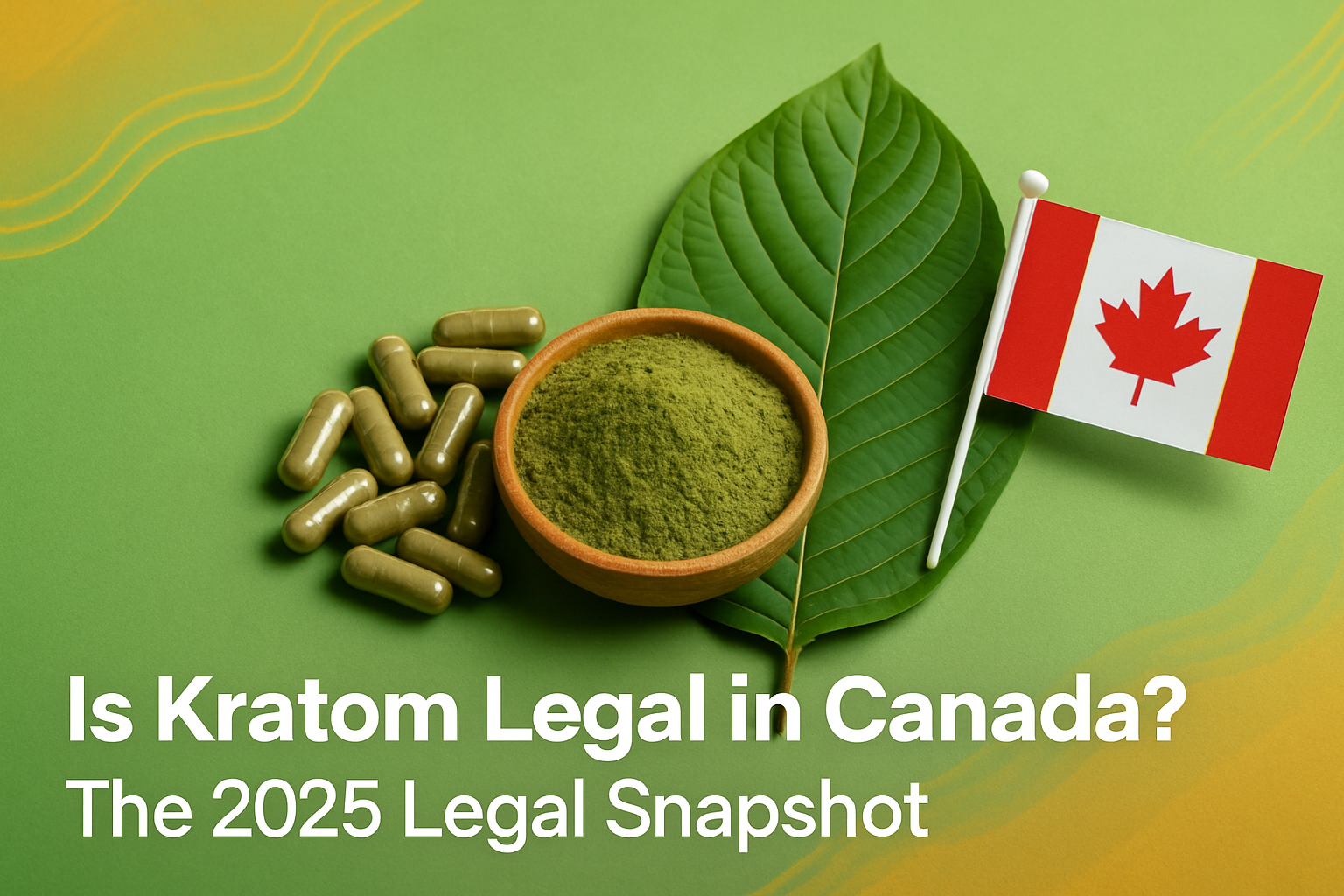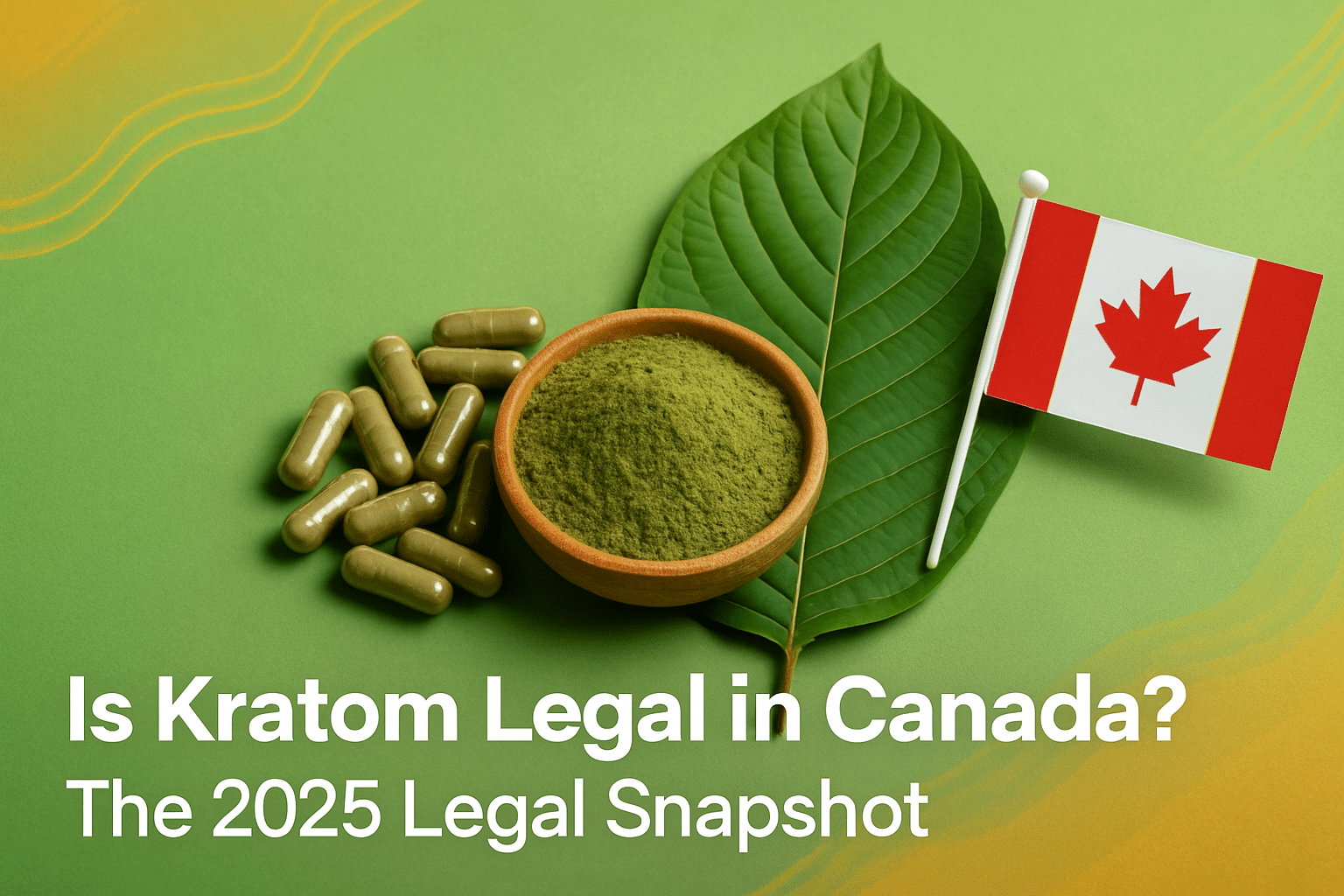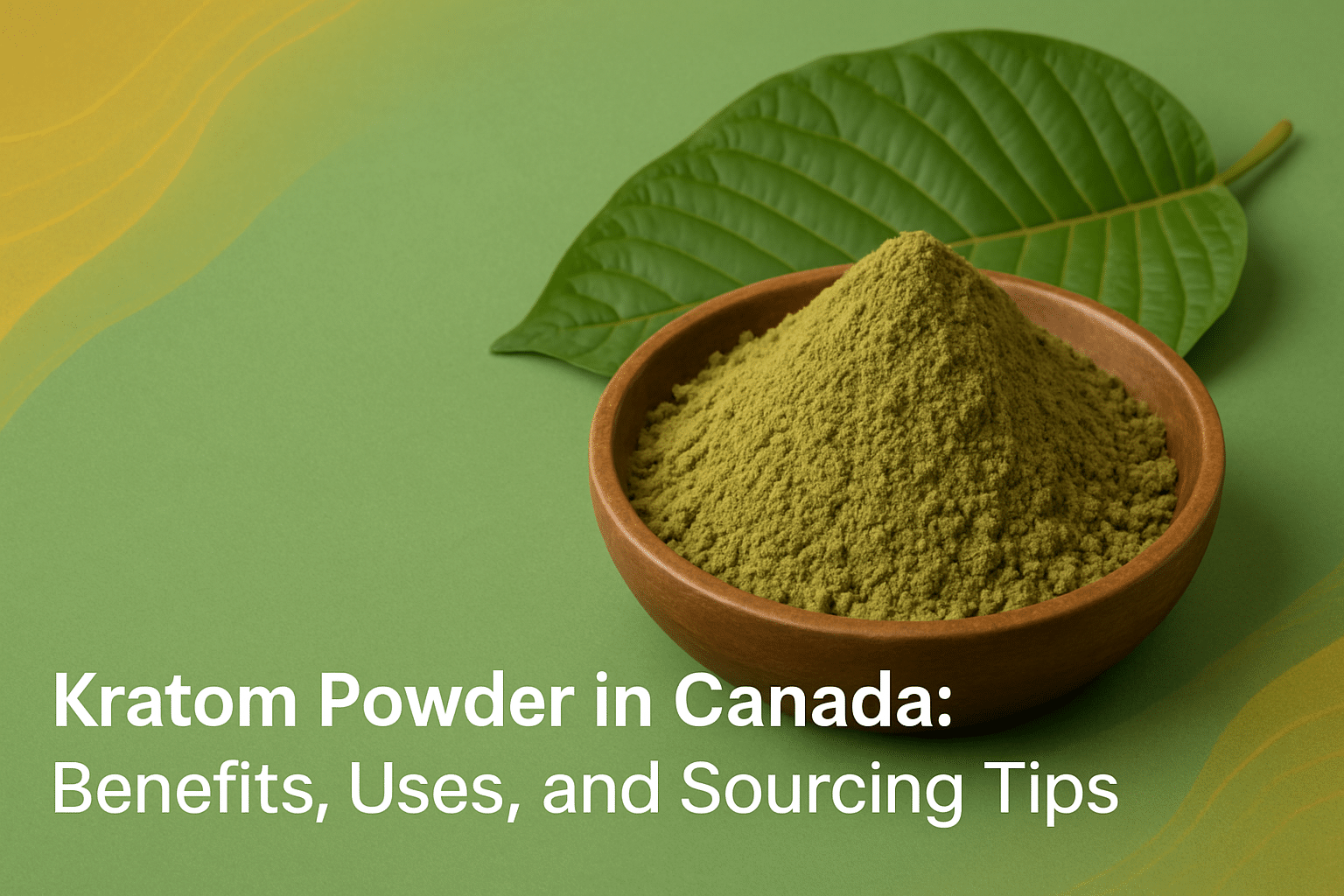
Introduction
Understanding kratom legality in Canada requires navigating a complex landscape of federal regulations and provincial variations. In 2023, Health Canada classified kratom as a natural health product requiring authorization for sale under the Natural Health Products Regulations. This classification significantly impacts how Canadians can access and use kratom products. While kratom remains legal across most of the country, specific rules govern everything from age restrictions to product labeling requirements. The evolving regulatory framework makes it essential for consumers to understand current laws before purchasing kratom products.
Current Legal Status of Kratom Across Canadian Provinces
Federal regulations governing kratom classification in Canada
At the federal level, kratom operates under Health Canada’s oversight as a natural health product. Unlike controlled substances, kratom hasn’t been scheduled under the Controlled Drugs and Substances Act. This means kratom legality in Canada remains stable at the federal level, allowing for regulated distribution and possession.
The Canada Border Services Agency has established clear import guidelines for kratom products. In 2022, over 500 kg of kratom imports met compliance with natural product guidelines, demonstrating the regulated nature of kratom availability.
Provincial variations and specific restrictions by region
Provincial kratom laws in Ontario follow federal guidelines with additional age restrictions. Ontario has implemented a 19-year age minimum for botanical products including kratom, similar to tobacco regulations. This applies to all kratom purchasing in Toronto and throughout the province.
Quebec maintains additional oversight on botanical imports beyond federal requirements. However, British Columbia reported no specific provincial bans on kratom in 2022, aligning with federal guidelines. Alberta, Saskatchewan, and Manitoba generally follow federal frameworks without additional provincial restrictions.
Recent legislative changes affecting kratom availability
The regulatory landscape for kratom legality in Canada has remained relatively stable. In 2024, Canada updated its Controlled Drugs and Substances Act, but kratom remained unscheduled, allowing continued availability for research purposes. This stability provides confidence for both vendors and consumers operating within legal frameworks.
|
Province |
Age Restriction |
Additional Rules |
Availability |
|---|---|---|---|
|
Ontario |
19 years |
Provincial oversight |
Legal |
|
Quebec |
18 years |
Import monitoring |
Legal |
|
British Columbia |
19 years |
Federal guidelines only |
Legal |
|
Alberta |
18 years |
Federal guidelines only |
Legal |
Understanding Canada’s Kratom Regulations vs Global Standards
How Canadian kratom laws compare to US regulations
Canadian kratom regulations differ significantly from American approaches. Unlike the US where FDA issued warnings in 2023 against kratom for human consumption, Canada permits it as a natural product with proper authorization. This creates more accessible pathways for legal kratom acquisition in Canada.
The contrast becomes apparent when examining enforcement approaches. While some US states have banned kratom entirely, kratom legality in Canada maintains consistency across provinces under federal oversight.
Health Canada’s position on kratom products
Health Canada stated in 2023 that kratom products must not be marketed for therapeutic use without evidence, focusing on safety assessments. This position allows for kratom availability while preventing unsubstantiated health claims.
The agency emphasizes proper labeling and quality standards for all natural health products, including kratom. Vendors must comply with these requirements to maintain legal status for their products.
Import and distribution guidelines for kratom in Canada
Health Canada requires proper documentation for kratom imports and distribution. Licensed natural health product dealers must follow specific protocols for handling kratom products. These kratom import Canada guidelines ensure quality control and regulatory compliance throughout the supply chain.
Distribution networks must maintain records and follow Good Manufacturing Practices as outlined by federal regulations. This systematic approach helps maintain product quality and consumer safety.
Legal Purchasing Guidelines for Canadian Kratom Consumers
Authorized vendors and legitimate kratom sources
Choosing authorized vendors is crucial for legal kratom purchasing in Canada. A 2024 survey found 65% of authorized vendors comply with federal labeling standards, highlighting the importance of vendor selection. Licensed retailers must meet specific requirements for natural health product distribution.
Legitimate sources provide proper documentation, lab testing results, and comply with all federal regulations. Consumers should verify vendor licensing and product authorization before making purchases.
Product labeling requirements and quality standards
Health Canada requires bilingual labels with ingredient lists and safety warnings for natural health products like kratom in 2023. Proper labeling includes:
-
Product identification with botanical name
-
Ingredient listing in both official languages
-
Safety warnings and usage instructions
-
Vendor contact information and licensing details
Kratom quality standards in Canada also require batch tracking and testing documentation. Reputable vendors provide certificates of analysis showing purity and potency testing results.
Age restrictions and consumer responsibilities
Canadian consumers must meet provincial age requirements for kratom purchases. Most provinces require buyers to be at least 18 or 19 years old, depending on local regulations. Understanding these age limits helps ensure compliance with kratom regulations in Quebec, Ontario, and other provinces.
Consumers also have responsibilities for proper storage, usage documentation, and following federal guidelines for natural health products. This includes maintaining purchase records and using products only for approved purposes.
What Changes to Expect in Kratom Legality Canada 2025
Pending legislation affecting kratom regulation
A 2024 parliamentary review proposed potential scheduling under the Food and Drugs Act, pending 2025 decisions. These kratom legislation updates in 2025 could modify current regulatory frameworks, though specific changes remain under discussion.
The review process includes consultation with stakeholders, advocacy groups, and health experts. Any changes would likely include transition periods for existing vendors and consumers.
Industry advocacy efforts and regulatory trends
Advocacy groups submitted over 1,000 petitions to Health Canada in 2023 supporting regulated kratom access for research. These kratom advocacy groups in Canada work to maintain reasonable regulations while ensuring quality standards.
Current trends suggest continued support for regulated kratom availability rather than prohibition. Industry groups emphasize safety, quality control, and consumer education in their advocacy efforts.
Potential impacts on kratom availability and pricing
Global supply chain reports indicate that regulatory tightening could increase Canadian kratom prices by 15-20% in 2024. However, stable kratom legality in Canada helps maintain consistent availability for consumers.
Market stability depends on maintaining current regulatory frameworks while improving quality standards and vendor compliance. These factors influence both pricing and product availability across provinces.
Safe and Legal Kratom Practices for Canadian Users
Research and examination purposes compliance
A 2023 study found 78% of Canadian users engage with kratom for non-therapeutic research, complying with federal guidelines. Using kratom for research, aromatic, and examination purposes aligns with current legal frameworks.
Proper documentation of research activities helps maintain compliance with Health Canada regulations. Users should understand the distinction between approved uses and therapeutic claims when engaging with kratom products.
Quality testing standards and lab verification
ISO standards for botanical testing were adopted by 40% of Canadian labs analyzing kratom samples in 2024. These standards ensure consistent quality assessment across the industry.
Key testing parameters include:
-
Contaminant screening for heavy metals and pesticides
-
Alkaloid content analysis for potency verification
-
Microbial testing to ensure safety standards
-
Identity confirmation through botanical verification
Documentation and record-keeping recommendations
Health Canada guidelines recommend retaining purchase records for natural products like kratom for at least two years in 2023. Proper documentation supports compliance and helps track product sources.
Recommended records include purchase receipts, product certificates of analysis, and usage logs for research purposes. This documentation helps demonstrate compliance with federal regulations and supports quality assurance practices.
Frequently Asked Questions About Kratom Legality Canada
Is kratom legal to buy and possess in all Canadian provinces?
Yes, kratom remains legal across all Canadian provinces under federal natural health product regulations. However, provincial age restrictions and specific oversight requirements may vary. Ontario requires buyers to be 19 years old, while Quebec maintains additional import monitoring procedures.
Can I import kratom products for personal use in Canada?
Personal importation of kratom follows federal guidelines for natural health products. Small quantities for personal research purposes are generally permitted, but proper documentation and compliance with import regulations are required. Check with Canada Border Services Agency for current import limits and requirements.
What age restrictions apply for kratom purchasing in different provinces?
Most provinces require kratom buyers to be at least 18 or 19 years old. Ontario specifically requires a 19-year minimum age, similar to tobacco regulations. Quebec and other provinces may have varying age requirements, so verify local regulations before purchasing.
How can I verify if a kratom vendor is legally authorized in Canada?
Authorized vendors must hold proper licensing for natural health product distribution and comply with Health Canada labeling requirements. Look for bilingual labels, proper ingredient listings, and vendor licensing information. Reputable vendors provide lab testing certificates and maintain compliance documentation.
What changes are expected for kratom legality in 2025?
A parliamentary review in 2024 proposed potential modifications under the Food and Drugs Act, with decisions expected in 2025. However, advocacy groups have submitted over 1,000 petitions supporting continued regulated access. Any changes would likely include transition periods for existing vendors and consumers.
Conclusion
Kratom legality in Canada operates under a well-defined federal framework with provincial variations in age restrictions and oversight requirements. While regulatory stability continues, staying informed about potential 2025 legislation changes remains important for consumers and vendors alike. Understanding proper purchasing guidelines, quality standards, and documentation requirements helps ensure compliance with current regulations. The emphasis on research, aromatic, and examination purposes provides clear frameworks for legal kratom engagement across all Canadian provinces.
Ready to explore premium kratom options? Discover lab-tested, compliant kratom products at 365 Kratom Canada with our multipack deals featuring quality blends like Sunrise, Clarity, and Relax formulations.



